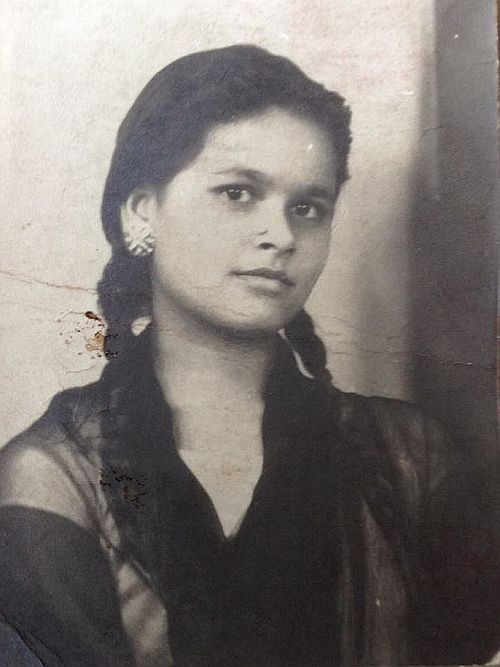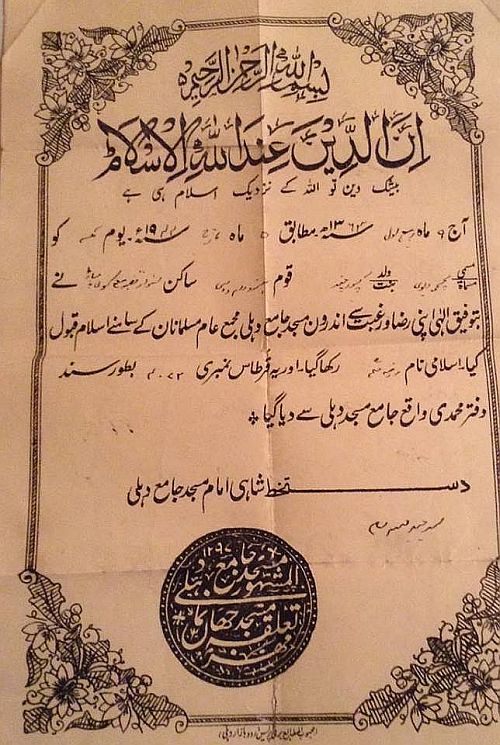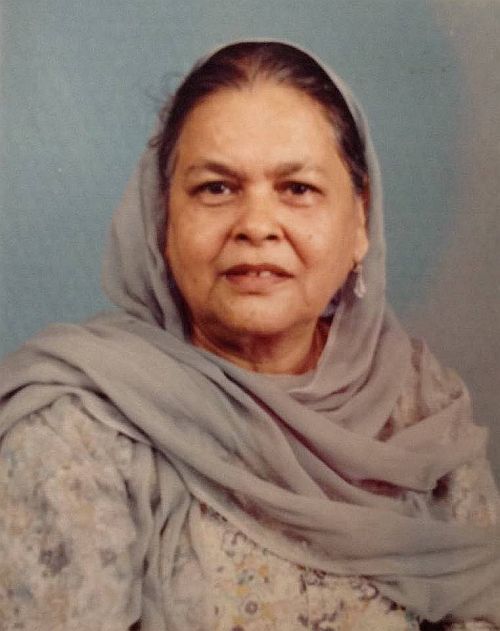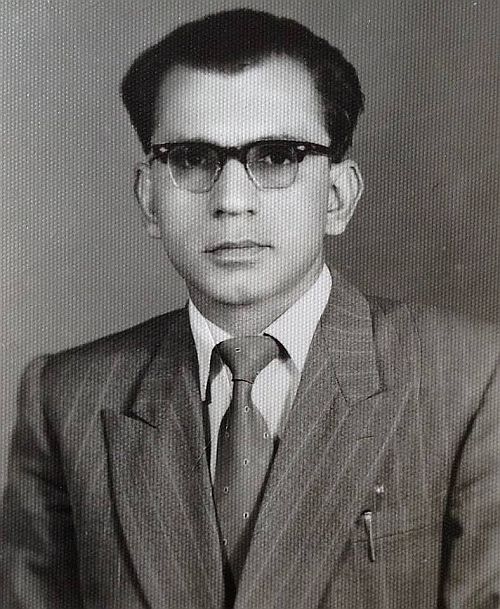Latest Contributions
My Mother’s Family in Pre-Partition Ludhiana
Category:
Tags:

I was born in Ludhiana on 19 April, 1943, though my recorded date of birth is 11 July, 1942. After India's Partition, I was raised and educated in Lahore. I studied at Forman Christian College, Lahore and University of the Punjab. In 1964, I was selected to join the Pakistan Air Force's (PAF) College of Aeronautical Engineering. I served in the PAF for 27 years, retiring voluntarily in 1991 as a Group Captain. My services were recognized with a National Award. I was told at the time of my retirement that if I did not retire, I was sure to get promoted to Air Commodore, with the strong possibility of another promotion to the rank of Air Vice Marshal. I cannot say what made me give up my career at its prime. The only reason that comes to my mind is that I was looking for "Fresh air". In my post retirement life I got what I was looking for, and have since lived a satisfied life.
Let me share some history of my mother’s family belonging to Ludhiana.
Noor Mohammad was my Nana (Maternal Grandfather). He had two brothers. The elder brother, Ghulam Muhammad (Lala), popularly known in the family as Lala, a name generally used for a father or elder brother in the Muslim families of India, and the younger brother was Wali Muhammad. Their elders migrated from Kashmir and settled in Ludhiana sometime in the beginning of 19th century. They used the surname of Sufi for reasons that I am not aware of. I am not sure if it is a sub-caste, a clan from Kashmir or their association with Sufism.
My Nana had two sisters. One was Mukhtar Begum. I cannot recall the name of the other one, though I have met her number of times. I have met all of them except Lala and Mukhtar Begum, as they died before my birth in 1943.
My Nana, and of course his brothers &\; sisters, were very closely related to a person by the name of Dr. Subhan. He was their khaloo, meaning that Dr. Subhan was the husband of their mother's sister.) (Editor note: In Hindi, the word for khaloo is mausa, and mother's sister is mausi.) By profession he was an eye doctor.
As the story goes, Dr. Subhan successfully treated a rich man from England, who suffered from some chronic eye disease. That person was so indebted to Dr. Subhan that he paid Dr. Subhan a large sum of money. The family lore says that it Rupees Nine Lac - a huge amount of money at that time.
Thus, his family was popularly known as Naulakha Family in Ludhiana. They had real estate in Ludhiana, Delhi, Shimla, Lahore and elsewhere. Naulakha Theater and Naulakha Gardens are perhaps still the milestones in the city of Ludhiana. It may be safe to say that this was the richest family in the city during the pre-partition era.
Dr. Subhan had two sons, Abdul Rehman Umar and Saeed-ur-Rehman, and two daughters Zohra, a twin of Saeed, and the last child Ayesha.
Lala, his sisters, and Dr. Subhan's children lived under one roof. Lala acted as caretaker as Dr. Subhan had to move from place to place in connection with his job. His eldest son Umar was sent to Aligarh for education, and the younger boy Saeed and the two girls were in the care of Lala.
As soon as Mukhtar Begum came of age, she was married to Allama Iqbal in about 1913. I believe Dr. Subhan must have played his role in this marriage as head of the family. Dr. Subhan did not live long after that, and died in 1916.
Lala was very close to his khaloo, and therefore continued the role he was assigned to as the eldest child of Dr. Subhan was barely 15, followed by twins (Saeed and Zohra) of about 13 years, and the last child, Ayesha, of around 11 years of age. As I said earlier, the eldest child Umar was at that time studying in Aligarh. At the demise of his father, he gave up his schooling at Aligarh and returned to Ludhiana.
Umar was perhaps headstrong. He quickly took over the management of his properties and pushed his cousin Lala aside. Both brothers Umar &\; Saeed built their houses in Ludhiana, and both called these houses Subhan Manzils. They also built a cinema house by the name of Naulakha Theater.
At this stage, their sisters Zohra and Ayesha sided with their cousin Lala. They insisted that their brothers should at least share some fortunes with Lala, and should not leave him high and dry. This was turned down by Umar and Saeed. The relationship of the girls therefore turned sour with the brothers, and they kept living independently.
At some stage during this period, Lala's wife expired. Zohra took over the responsibilities of raising his children, as it was now time to reciprocate and return the favours of Lala. Zohra not only raised these children, but married his daughter Akhtar to Nawabzada Walayat Ali Khan, son of Nawabzada Liaqat Ali Khan (First Prime Minister of Pakistan). She continued acting as head of family for Lala's children for her entire life and even extended her support to his grand children.
Lala had two sons Abdul Bari and Abdul Raheem (nick name Deemoo), and two daughters Akhtar and Khursheed. As I said earlier, Akhtar was married to the son of Nawabzada Liaqat Ali Khan, and Khursheed was married to someone in Lahore. Deemoo married a Hindu girl, whose name was changed to Razia Begum after conversion to Islam in 1944. They all lived in Lahore after Partition.

Razia Begum, wife of Abdul Raheem

Certificate of conversion of Lachmi (guess) Devi to Islam with the name of Razia
Her father's name is Kapoor Chand
Issued By Jamia Masjid, Delhi 5 March 1944

Razia Begum, wife of Abdul Raheem

Abdul Raheem (nick name Deemoo)
It will not be out of place to mention here that Ayesha, at the time of partition in 1947, decided to stay back in India. She did not join her brothers and sister in migrating to Pakistan. I am also told that she married a person named Dr. Kedar Nath from Ludhiana. I am not privy to the mutual relations of Dr. Kedar Nath and Ayesha. However, I am told that she did not have any children of her own, and adopted a girl named Yasmeen. Both Ayesha and Yasmeen visited Pakistan once. Yasmeen stayed almost a year but returned to India by her own choice.
I have heard from my Nani, wife of Noor Muhammad, about how Mukhtar Begum died. She fell sick while she was in the family way. Nani described that she was sitting with Mukhtar Begum with her head in Nani's lap when Allama Iqbal walked in the room. He stood at a little distance from the bed, and raised his hands for prayer. She assumed that while he must have prayed for his wife, he did not leave her out of his prayers. She believed that he must have prayed for her and for her child - she was pregnant at that time.
After the death of Mukhtar Begum, Allama Iqbal proposed to marry Zohra, Dr. Subhan's older daughter, but she declined.
My mother, Mehmooda, described a meeting with Allama Iqbal while he was visiting them in Shimla. She narrated that one day the girls in the family were having a mock funeral. One girl was asked to lie down in bed, pretending to be dead, and the rest of the girls were sitting beside the bed in mourning. Suddenly Allama Iqbal appeared from a room. Seeing him, the girls took off and ran away. Allama Iqbal decided to have a get together with the kids in the family. He asked that a party should be arranged for him to be with the children over some food of their liking.
Such a party was arranged. Allama Iqbal played as host to the kids. He would ask from a child for his or her liking, and then he would recite some poetry regarding that food. My mother loved it.
© Khawaja Nazir Ahmad 2017
Comments
Add new comment